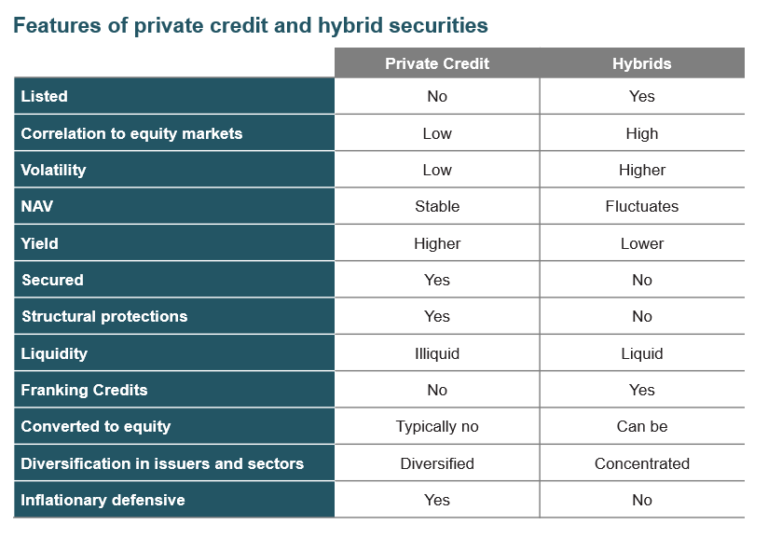5 Do's And Don'ts For Landing A Private Credit Job

Table of Contents
2. Main Points:
2.1 DO: Network Strategically to Find Hidden Gems in Private Credit
Networking is paramount in the private credit industry. Many ideal private credit jobs aren't advertised publicly. Actively cultivate your network to uncover these hidden opportunities.
- Leverage LinkedIn Effectively: Optimize your LinkedIn profile with relevant keywords like private credit, credit analyst, and alternative lending. Connect with professionals working in private credit firms and actively engage in industry discussions.
- Attend Industry Events: Conferences focused on private equity, alternative investments, and private debt offer invaluable networking opportunities. These events provide a chance to meet recruiters and potential employers.
- Informational Interviews: Don't underestimate the power of informational interviews. Reach out to professionals in private credit roles for insightful conversations about their careers and the industry. These conversations can lead to unexpected job opportunities.
Remember, effective private credit networking is about building genuine relationships, not just collecting contacts.
2.2 DO: Tailor Your Resume and Cover Letter for Each Private Credit Role
Generic applications rarely succeed in a competitive market. Each private credit resume and private credit cover letter should be meticulously tailored to the specific job description.
- Highlight Relevant Skills: Emphasize skills and experience directly relevant to the job posting. Quantify your achievements using metrics to showcase your impact (e.g., "Increased ROI by 15%," "Reduced risk by 10%").
- Incorporate Keywords: Integrate keywords from the job description naturally into your resume and cover letter. This improves your chances of getting past Applicant Tracking Systems (ATS).
- Showcase Expertise: Demonstrate your understanding of private credit strategies such as direct lending, mezzanine financing, and other relevant investment techniques. Mention any experience with financial modeling, credit analysis, and valuation.
A well-crafted resume and cover letter act as your initial impression—make it count.
2.3 DON'T: Underestimate the Importance of Financial Modeling Skills
Proficiency in financial modeling is non-negotiable for most private credit roles. Financial modeling for private credit involves building complex models in Excel to analyze potential investments.
- Master Excel: Develop strong Excel skills, including proficiency in DCF modeling, LBO modeling, and other relevant valuation techniques.
- Practice Building Models: Practice creating complex financial models related to private credit investments to showcase your abilities during interviews.
- Understand Financial Statements: Demonstrate a thorough understanding of financial statements and their application in credit analysis.
Failing to demonstrate these skills will significantly hinder your chances.
2.4 DO: Ace the Private Credit Interview with Thorough Preparation
Thorough preparation is crucial for success in a private credit interview.
- Research the Firm: Research the firm's investment strategy, recent deals, and team members. Understand their culture and values.
- Prepare for Questions: Prepare answers to common private credit interview questions, including behavioral questions and technical questions about financial modeling and credit analysis.
- Practice Communication: Practice explaining complex concepts clearly and concisely. Your ability to communicate effectively is just as important as your technical skills.
- Prepare Questions to Ask: Prepare thoughtful questions to demonstrate your genuine interest in the role and the firm.
A well-prepared interview showcases your professionalism and enthusiasm.
2.5 DON'T: Neglect Due Diligence on Potential Employers
Just as you're being assessed, you should also assess potential employers. Conduct thorough due diligence on each firm.
- Research the Firm's Investment Strategy: Understand their investment focus, target sectors, and recent investment activity.
- Assess the Culture: Research the firm's culture and values to determine if it aligns with your career goals and personal preferences. Review employee reviews on sites like Glassdoor.
- Consider Long-Term Opportunities: Assess the firm's reputation and the potential for career progression within the organization.
Choosing the right firm is as crucial as securing the job itself.
3. Conclusion: Securing Your Private Credit Career: A Recap and Call to Action
Landing a coveted private credit job requires a strategic approach. This article highlighted five key "Do's" and "Don'ts": network effectively, tailor your applications, master financial modeling, ace the interview, and conduct thorough due diligence on potential employers. By implementing these tips and dedicating yourself to thorough preparation, you’ll significantly increase your chances of success in your private credit job search. Start your journey toward landing your dream private credit job today by implementing these tips. Good luck with your private credit career aspirations!

Featured Posts
-
 Pope Francis His Life Legacy And Enduring Call For Compassion
Apr 22, 2025
Pope Francis His Life Legacy And Enduring Call For Compassion
Apr 22, 2025 -
 Joint Nordic Defense The Role Of Sweden And Finlands Military Assets
Apr 22, 2025
Joint Nordic Defense The Role Of Sweden And Finlands Military Assets
Apr 22, 2025 -
 Bof A Reassures Investors Why Current Stock Market Valuations Arent A Threat
Apr 22, 2025
Bof A Reassures Investors Why Current Stock Market Valuations Arent A Threat
Apr 22, 2025 -
 Razer Blade 16 2025 Review Is The Price Worth The Performance
Apr 22, 2025
Razer Blade 16 2025 Review Is The Price Worth The Performance
Apr 22, 2025 -
 The Countrys Top New Business Locations A Geographic Analysis
Apr 22, 2025
The Countrys Top New Business Locations A Geographic Analysis
Apr 22, 2025
